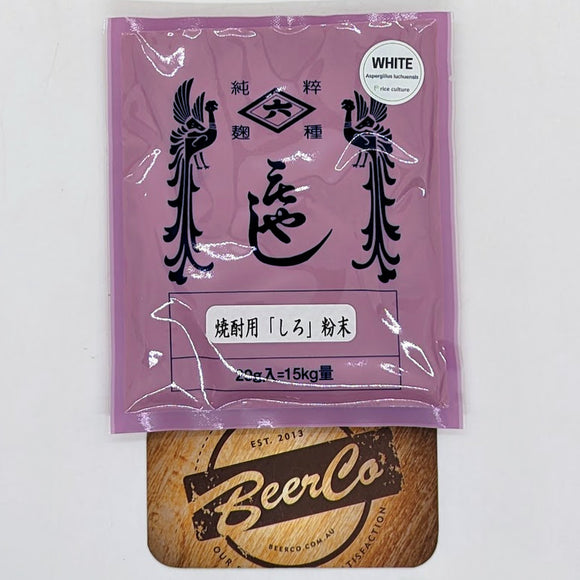Shiro Koji for Shochu. This is a Koji culture to be used to ferment your own Koji.
This is an albino variety of Black Koji spores (Aspergillus luchuensis or more specifically Aspergillus kawachii) and is a unique koji variety that produces citric acid. It is traditionally used to brew distilled alcohol (Shochu) in the southern region of Japan. The high acidity was beneficial to prevent growth of other microbes in hot and humid climate.
White Koji has a more lemon-like flavour compared to the plum-like flavour of Black Koji. White Koji can be used to make home-made Koji seasonings, fruity sweet Koji drink (Amazake/Ama-Koji) and many other unique dishes. It can also be used to make Soy Sauce Koji with a Ponzu-like seasoning.
1 packet (20g) of Aspergillus luchuensis / Aspergillus kawachii can be used to ferment 15kg of rice.
This product is from HISHIROKU in Kyoto, one of only ten Koji Starter producers left in Japan, with over 300 years history.
Ingredients: Koji starter (Aspergillus luchuensis)
[Shipping Conditions] This product is safe to ship by Standard Shipping.
How To Make A Koji Starter
What You'll Need:
- Rice 15Kg
Directions:
- Sterilise all equipment with alcohol or vinegar
- Soak rice in water for 12-24 hours
- Steam rice until cooked (Do Not use rice cooker, as rice will be too soggy)
- Sprinkle Koji Starter 20g over cooled rice and mix thoroughly
- Ideally keep in a warm humid environment until fermentation begins (approx. 24 hours at 35-38 degrees)
- Keep Koji moist using a damp cloth
- Keep temperature under 40 degrees, breaking up and mixing Koji if needed
- After 50 hours the Koji should start to give off sweet chestnut smell, it is now ready to use or store. Can be stored in freezer for up to 3 months
- Healthy Koji should have lost its opaqueness and white on the surface. When not mixed it should be packed into blocks and taste sweet
Uses:
- Shochu preparation and fermentation
Knowledge and information and Reading on Shochu:
Strickland (2021) Distiller's Guide to Japanese Shochu

